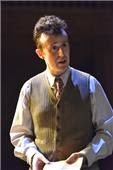John Heffernan as Oppenheimer. Photo:Keith Pattison
Reviewed by James
Karas
Tom Morton-Smith has written a very ambitious and engaging play about J.
Robert Oppenheimer, the great physicist and one of the main creators of the
atomic bomb during World War II. Oppenheimer is now playing at London’s
Vaudeville Theatre in a superb production by the Royal Shakespeare Company.
Morton-Smith wants to capture the personal story of Oppenheimer, the
political milieu of a communist-scared America at war and the work of some of
the smartest people on earth on a massive project. It is a great story that is
almost impossible to capture in less than three hours on stage but the
playwright certainly tries.
The personal story is about a driven genius who must choose between his
ambitions as a scientist and his social principles as a human being. As a
scientist he must confront the incalculable difficulties of creating an atomic
bomb and the fact that he is creating a weapon that can make him a hero but
also a destroyer of worlds. He is an unfaithful husband, and must deny or hide
his socialist beliefs and betray his friends. It is indeed a complex story.
Morton-Smith brings on a large number of characters who rush on and off
the stage. There are parties, gatherings and bar scenes. Complex scientific
data about fission, fusion and enriched uranium have to be explained to
ordinary people, i.e. us, the audience. These things can get incomprehensible
if not boring. Director Angus Jackson tries to solve the problem by making the
actors hyperkinetic as if they were jumping up and down in a musical. It works
most of the time and the rationale behind the method is understandable.
I found it difficult at times to follow
who is who on stage but the main thrust of the story came out quite well.
Oppenheimer cavorted with communists and was sympathetic to the Soviets. Even
when the U.S. was an ally of the Soviet Union, that type of relationship was
frowned upon to put it mildly. Oppenheimer gets the message but finds it
impossible to have all his fellow travelers of the past disassociate themselves
from leftist causes.
Things are not easier when Oppenheimer has to deal with his personal
issues and the egos of military men and other scientists.
It is a riveting story told around the play’s main character. John
Heffernan as Oppenheimer is lean, passionate, troubled, full of ambition and
gives an outstanding performance. The other actors pale in comparison to him
because Morton-Smith spends relatively little time in developing their
characters. The ensemble acting under the direction of Jackson is worthy of
high praise.
Morton-Smith seems to have run out of steam near the end of the play. The
play finishes on a different tone. What looks like a chorus from Greek tragedy
appears and a child pops his head up from a model atomic bomb. The little boy
gives flash descriptions of what happened in Hiroshima. Oppenheimer becomes
reflective and philosophical. He realizes that his great achievement has been
to become Death.
The story is history on a grand scale with fundamental issues of
morality, science and human behaviour. And it is superb theatre.
_________
Oppenheimer by Tom
Morton-Smith continues until May 23, 2015 at the Vaudeville Theatre, Strand,
London, England. www.rsc.org.uk

No comments:
Post a Comment